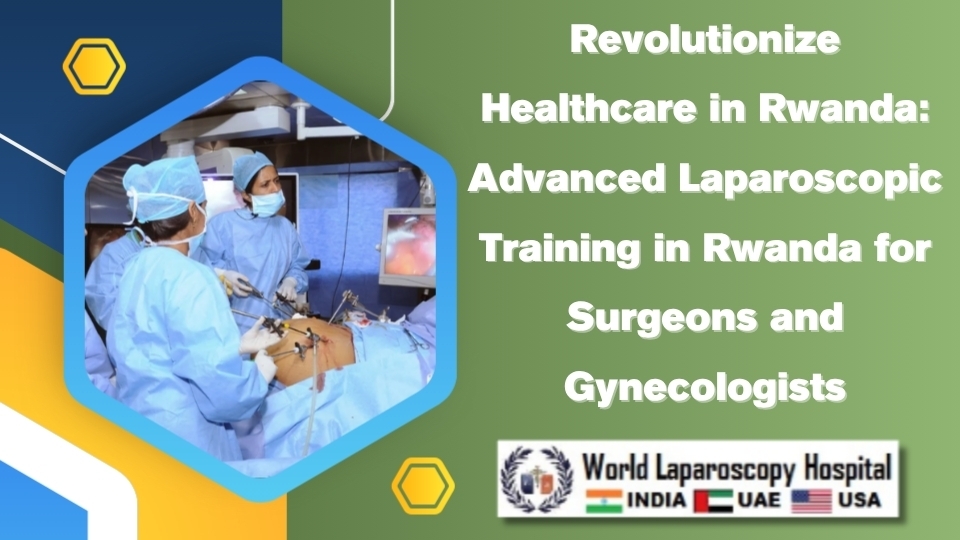
Revolutionize Healthcare in Rwanda: Advanced Laparoscopic Training in Rwanda for Surgeons and Gynecologists
Revolutionize Healthcare in Rwanda: Advanced Laparoscopic Training in Rwanda for Surgeons and Gynecologists
At World Laparoscopy Hospital, we take pride in having trained many surgeons from Rwanda, empowering them with cutting-edge laparoscopic surgery skills to revolutionize surgery in their country. This blog is a special invitation to Rwandan surgeons to join our expert laparoscopic training course, combined with a celebration of Rwanda’s remarkable civilization and rich history, making your journey into advanced surgery not only skillful but deeply connected to your proud heritage. Our aim is to make laparoscopic training accessible to surgeons of Rwanda, enhancing healthcare while honoring the roots of this great East African nation.
Leading Laparoscopic Training for Rwandan Surgeons
Laparoscopic surgery, also known as minimally invasive surgery (MIS), is transforming how surgeries are performed globally. It reduces patient recovery time, pain, and complications, and it requires specialized training. Rwanda is quickly embracing this technology, with institutions such as the University of Rwanda and the University Teaching Hospitals (like CHUK) building capacity to train surgeons in MIS. Since 2015, Rwanda has made substantial progress with minimally invasive surgery, supported by programs training young doctors to become laparoscopic experts and trainers themselves.
World Laparoscopy Hospital offers comprehensive courses designed to equip surgeons from Rwanda with all the necessary skills—from fundamentals to advanced laparoscopic techniques. Our training blends theory with extensive hands-on practice, ensuring surgeons become confident and independent in performing complex laparoscopic procedures. This training is crucial as Rwanda continues to integrate modern surgical methods to improve patient outcomes and healthcare standards. By joining our program, Rwandan surgeons gain access to world-class education that aligns with their country’s growing medical infrastructure and the aspirations of the Rwandan medical community.
Rwanda’s Proud Civilization: A Legacy of Unity and Innovation
Rwanda’s civilization traces back thousands of years. The land was initially inhabited by the Twa, an indigenous pygmy hunter-gatherer community, ancestors of Rwanda’s earliest societies. Around 1000 CE, Bantu-speaking agriculturalists arrived bringing settled farming and social structures which grew into organized clans. These clans eventually evolved into powerful kingdoms, the most notable being the Kingdom of Rwanda.
One of the pivotal figures in Rwandan history is King Gihanga Ngomijana, who established the first major kingdom in 1081 CE. Known for unifying the region, King Gihanga’s reign is considered the foundation of Rwanda’s historic statecraft and culture. According to tradition, he also introduced key advances such as cattle rearing, blacksmithing, and woodworking, which became central to Rwandan identity.
Through the centuries, Rwanda grew under centralized governance with a sophisticated social framework. By the 15th to 16th centuries, the Tutsi cattle-herding elite migrated into the region, integrating with the established societies to create a structured kingdom with layers of authority and clan lineages. Despite challenges, this civilization maintained remarkable social cohesion and innovation. The rich cultural heritage of Rwanda—from oral history and traditional arts to community solidarity—resonates today with its people, inspiring progress and resilience.
Rwanda’s Historical Stories: Strength from Struggles
Rwanda’s history includes significant transformations through colonialism, revolution, and recovery. During the colonial era, Rwanda was controlled by Germany and Belgium, with political power concentrated in the Tutsi monarchy. The mid-20th century saw profound ethnic tensions culminating in the Rwandan Revolution (1959-1961), which marked a major shift as the Hutu majority gained political power following the struggle for independence.
One of the most tragic yet defining moments in modern history was the 1994 Rwandan Genocide, where ethnic violence led to massive loss of life. However, Rwanda’s story is also one of remarkable healing and rebuilding. Today, Rwanda stands as a beacon of unity, development, and reconciliation across Africa. This spirit of resilience and progress is what drives Rwanda’s ongoing transformation, including advances in medical fields such as laparoscopic surgery.
Why Choose World Laparoscopy Hospital?
-
Expertise with Experience: We have trained numerous Rwandan surgeons who have returned home to successfully implement laparoscopic surgery techniques.
-
Comprehensive Curriculum: Our courses cover foundational knowledge to advanced laparoscopic procedures, tailored to meet the needs of surgeons in Rwanda.
-
Hands-On Practical Training: Using advanced simulation labs and real-case surgery exposure, trainees gain confidence and skill mastery.
-
Cultural Connection: We understand the importance of Rwanda’s heritage and aim to support surgeons in building a future that honors the past.
-
Global Recognition: Graduates receive certification recognized globally, opening doors to international professional opportunities.
Join Us and Transform Surgery in Rwanda
By enrolling in World Laparoscopy Hospital’s training, Rwandan surgeons will harness cutting-edge skills necessary for modern surgical care, directly impacting patient outcomes and the healthcare system. The legacy of Rwanda’s historical genius and unity is a powerful backdrop for this new era of medical excellence. Let this training be a milestone in your professional journey, contributing to Rwanda’s growth as a center of surgical innovation in Africa.
Advance your career with us—because Rwanda deserves world-class laparoscopic surgeons who cherish their heritage while shaping the future of medicine.
This blend of Rwanda’s great civilization and its modern laparoscopic surgical advancements in our training program will help attract surgeons searching specifically for laparoscopic training in Rwanda, improving search rankings and inspiring healthcare progress in the country.
Let us build together a legacy of skilled surgeons who carry the spirit of Rwanda’s history and walk boldly into the future of minimally invasive surgery.





